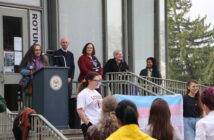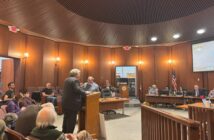The U.S. presidential primary system has always been an inexact science. As the country begrudgingly marches to another election deemed “the most important election of our lives,” this cycle’s primaries feel exceptionally gratuitous.
Incumbent President Joe Biden is essentially running unopposed as his party’s nominee despite his low 39% approval rating, according to polling by ABC News.
Meanwhile, presumed Republican nominee Donald Trump looks unfazed by the countless indictments and questions about his eligibility to remain on the ballot in some states in his quest to return to the White House.
Trump outshined his republican rival Nikki Haley in the opening Iowa caucuses and the New Hampshire primary. And with the Nevada Republican caucus starting on Feb. 6, it’s only a matter of time before Haley concedes the nomination to Trump.
The nine-month long runway is cleared for the inevitable Trump against Biden rematch.
There will be plenty of time to dissect round two of the battle between 77-year-old Trump and 81-year-old Biden, but before we move on to the general election, we need to address the effectiveness of the party primary system.
The concept of presidential primaries is not mentioned in the Constitution. For much of the country’s history, party leaders would convene and choose their nominees in what could be adequately described as the least democratic way of choosing a candidate.
The 1968 Democratic National Convention was the boiling point for the popular desire to not match the party’s nominee.
By this point, there was a primary system similar to ours today. States would hold a vote to determine the most desired candidate in each state, but the real nominating process was carried out when state delegates met at the respective party’s national convention.
Democratic incumbent President Lyndon B. Johnson announced he would not be running for re-election well into the primary process and claimed his delegates should be inherited by Vice President Hubert Humphrey.
At the convention, delegates nominated Humphrey despite him not earning a single vote in the primary, which sparked fierce outrage from the Democratic Party, already divided by the continuation of the Vietnam War.
The disastrous 1968 convention inspired dramatic primary reform to enhance the power of popular will in selecting candidates.
It’s time for another reform of the primary process in 2024.
For starters, each state’s primary election should take place on the same day. In this election cycle, the primary process started on Jan. 15 with the Iowa caucuses. It will culminate in the Guam and U.S. Virgin Islands primaries on June 8 (assuming there are no runoff elections).
A lot can change in six months. Just think back to the 2020 election. By the end of January, there were only seven confirmed COVID cases in the U.S. By June, the virus was raging throughout the country, giving voters an entirely new set of questions to ponder in the ballot box.
The inconsistent primary schedule also creates uneven levels of importance depending on when the primary in your state takes place. Late process primaries become futile if the candidate has already achieved enough delegates to secure the nomination beforehand.
Realistically, total uniformity of primary customs between states isn’t practical because of each state’s unique political makeup. With that being said, closed primaries, primary elections in which only registered party members can vote, should be avoided unless they are in a deep red or blue state.
In convincingly red or blue states, open primaries run the risk of obstruction from partisan opposition.
Contrarily, toss-up or purple states, such as Pennsylvania and Nevada should switch to open primaries to more accurately represent their populations. Non-party registered voters should still be able have their voices heard in these states.
Unite America, a grassroots political organization, found alarming data regarding how democratic our primary process really is.
According to one study, “Only 10% of eligible Americans nationwide cast ballots in primary elections that effectively decided the winners in a supermajority (83%) of Congressional seats.”
Similarly, parties should be more open to primary their incumbents, particularly when they are falling behind in approval from voters.
A poll from Reuters found that 70% of voters think Biden should not seek re-election, while 56% of voters think Trump should not seek re-election.
Perhaps it is wishful thinking, but a widespread democratic primary process could yield results more in tune with popular will and prevent unfavorable candidates from securing their party’s nomination.






Comment policy
Comments posted to The Brown and White website are reviewed by a moderator before being approved. Incendiary speech or harassing language, including comments targeted at individuals, may be deemed unacceptable and not published. Spam and other soliciting will also be declined.
The Brown and White also reserves the right to not publish entirely anonymous comments.
1 Comment
Georgia primaries are not open but you have the choice of which party to vote for. As a Republican in a Democratic district I have the ability to pick the Democrat that is least objectionable. With the latest redistricting, there is actually a Democrat running that I want to vote for.